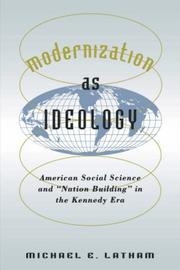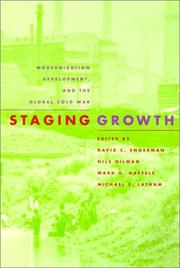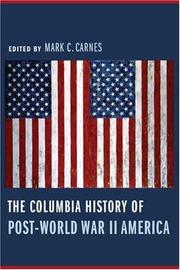| Listing 1 - 7 of 7 |
Sort by
|
Book
ISBN: 9780801477263 9780801446047 080144604X 0801477263 Year: 2011 Publisher: Ithaca London Cornell University Press
Abstract | Keywords | Export | Availability | Bookmark
 Loading...
Loading...Choose an application
- Reference Manager
- EndNote
- RefWorks (Direct export to RefWorks)
After World War II, a powerful conviction took hold among American intellectuals and policymakers: that the United States could profoundly accelerate and ultimately direct the development of the decolonizing world, serving as a modernizing force around the globe. By accelerating economic growth, promoting agricultural expansion, and encouraging the rise of enlightened elites, they hoped to link development with security, preventing revolutions and rapidly creating liberal, capitalist states. In The Right Kind of Revolution, Michael E. Latham explores the role of modernization and development in U.S. foreign policy from the early Cold War through the present. The modernization project rarely went as its architects anticipated. Nationalist leaders in postcolonial states such as India, Ghana, and Egypt pursued their own independent visions of development. Attempts to promote technological solutions to development problems also created unintended consequences by increasing inequality, damaging the environment, and supporting coercive social policies. In countries such as Guatemala, South Vietnam, and Iran, U.S. officials and policymakers turned to modernization as a means of counterinsurgency and control, ultimately shoring up dictatorial regimes and exacerbating the very revolutionary dangers they wished to resolve. Those failures contributed to a growing challenge to modernization theory in the late 1960s and 1970s. Since the end of the Cold War the faith in modernization as a panacea has reemerged. The idea of a global New Deal, however, has been replaced by a neoliberal emphasis on the power of markets to shape developing nations in benevolent ways. U.S. policymakers have continued to insist that history has a clear, universal direction, but events in Iraq and Afghanistan give the lie to modernization's false hopes and appealing promises.
United States --- Etats-Unis --- Foreign relations --- Relations extérieures --- #SBIB:327H15 --- #SBIB:328H31 --- Buitenlandse politiek: Noord-Amerika --- Instellingen en beleid: VSA / USA --- Geschichte 1945-2011. --- Relations extérieures --- 1945-1989 --- 1989 --- -United States --- -#SBIB:327H15
Book
ISBN: 0801460565 0801460530 9780801460531 9780801446047 9780801477263 080144604X 0801477263 9780801460562 Year: 2011 Publisher: Ithaca, NY
Abstract | Keywords | Export | Availability | Bookmark
 Loading...
Loading...Choose an application
- Reference Manager
- EndNote
- RefWorks (Direct export to RefWorks)
After World War II, a powerful conviction took hold among American intellectuals and policymakers: that the United States could profoundly accelerate and ultimately direct the development of the decolonizing world, serving as a modernizing force around the globe. By accelerating economic growth, promoting agricultural expansion, and encouraging the rise of enlightened elites, they hoped to link development with security, preventing revolutions and rapidly creating liberal, capitalist states. In The Right Kind of Revolution, Michael E. Latham explores the role of modernization and development in U.S. foreign policy from the early Cold War through the present. The modernization project rarely went as its architects anticipated. Nationalist leaders in postcolonial states such as India, Ghana, and Egypt pursued their own independent visions of development. Attempts to promote technological solutions to development problems also created unintended consequences by increasing inequality, damaging the environment, and supporting coercive social policies. In countries such as Guatemala, South Vietnam, and Iran, U.S. officials and policymakers turned to modernization as a means of counterinsurgency and control, ultimately shoring up dictatorial regimes and exacerbating the very revolutionary dangers they wished to resolve. Those failures contributed to a growing challenge to modernization theory in the late 1960's and 1970's. Since the end of the Cold War the faith in modernization as a panacea has reemerged. The idea of a global New Deal, however, has been replaced by a neoliberal emphasis on the power of markets to shape developing nations in benevolent ways. U.S. policymakers have continued to insist that history has a clear, universal direction, but events in Iraq and Afghanistan give the lie to modernization's false hopes and appealing promises.

ISBN: 0807860794 9780807860793 0807825336 9780807825334 0807848441 9780807848449 0807825336 9780807825334 9798890867933 Year: 2000 Publisher: Chapel Hill The University of North Carolina Press
Abstract | Keywords | Export | Availability | Bookmark
 Loading...
Loading...Choose an application
- Reference Manager
- EndNote
- RefWorks (Direct export to RefWorks)
A discussion of the intellectual and cultural dimensions of the Cold War, revealing how social science theory helped shape American foreign policy during the Kennedy administration. It demonstrates how the concept of global modernization became a motivating ideology behind policy decisions.
Social sciences --- Nationalism --- Social change --- Economic development projects --- Development projects, Economic --- Projects, Economic development --- Economic assistance --- Technical assistance --- Change, Social --- Cultural change --- Cultural transformation --- Societal change --- Socio-cultural change --- Social history --- Social evolution --- Consciousness, National --- Identity, National --- National consciousness --- National identity --- International relations --- Patriotism --- Political science --- Autonomy and independence movements --- Internationalism --- Political messianism --- Behavioral sciences --- Human sciences --- Sciences, Social --- Social science --- Social studies --- Civilization --- Political aspects --- History --- Alliance for Progress. --- Peace Corps (U.S.) --- United States. --- Cuerpo de Paz (U.S.) --- Cuerpos de la Paz (U.S.) --- Cuerpos de Paz (U.S.) --- Ėnkh Taĭvny Korpus (U.S.) --- Korpus mira (U.S.) --- U.S. Peace Corps --- United States Peace Corps --- Alianza para el Progreso --- United States --- Developing countries --- Foreign relations --- Economic conditions. --- Nation-building --- 812 Ideologie --- Stabilization and reconstruction (International relations) --- State-building --- Political development --- International relations. Foreign policy --- Economic conditions. Economic development --- Nation-building. --- Aliança para o Progresso --- United States of America
Digital
ISBN: 9780801460531 9780801446047 Year: 2011 Publisher: Ithaca, N.Y. Cornell University Press
Abstract | Keywords | Export | Availability | Bookmark
 Loading...
Loading...Choose an application
- Reference Manager
- EndNote
- RefWorks (Direct export to RefWorks)

ISBN: 9781558493704 1558493697 1558493700 Year: 2003 Publisher: Amherst, Boston : University of Massachusetts Press,
Abstract | Keywords | Export | Availability | Bookmark
 Loading...
Loading...Choose an application
- Reference Manager
- EndNote
- RefWorks (Direct export to RefWorks)
Situating the examination within the context of the Cold War, 10 issues thematically explore historical issues of modernization and development in a variety of settings. The papers first look at American formulations of the ideas before turning their attention to the way non-Western countries contests modernization. Topics discussed include the role of U.S. overseas propaganda in the ideology of modernization, colonial and anticolonial development ideologies in Mozambique, and the view of modernization promoted by South Korean intellectuals
Globalization. --- World politics. --- Democracy. --- Political culture. --- Cultural policy. --- Social change --- Mondialisation --- Politique mondiale --- Démocratie --- Culture politique --- Politique culturelle --- Changement social --- Developing countries --- Pays en développement --- Economic conditions. --- Conditions économiques --- Démocratie --- Pays en développement --- Conditions économiques


ISBN: 9780231511803 9789780121266 9780231129145 9780231121262 Year: 2007 Publisher: New York, NY
Abstract | Keywords | Export | Availability | Bookmark
 Loading...
Loading...Choose an application
- Reference Manager
- EndNote
- RefWorks (Direct export to RefWorks)
Etats-unis --- Histoire --- Conditions sociales --- Politique et gouvernement --- 1945 --- -Conditions sociales --- 1945-1989


ISBN: 9780231511803 9780231121262 Year: 2007 Publisher: New York, N.Y. Columbia University Press
Abstract | Keywords | Export | Availability | Bookmark
 Loading...
Loading...Choose an application
- Reference Manager
- EndNote
- RefWorks (Direct export to RefWorks)
| Listing 1 - 7 of 7 |
Sort by
|

 Search
Search Feedback
Feedback About UniCat
About UniCat  Help
Help News
News